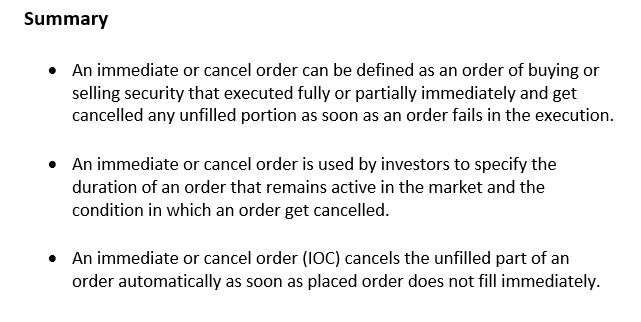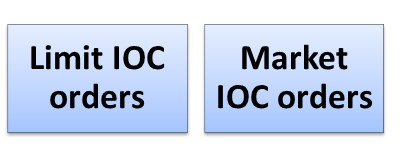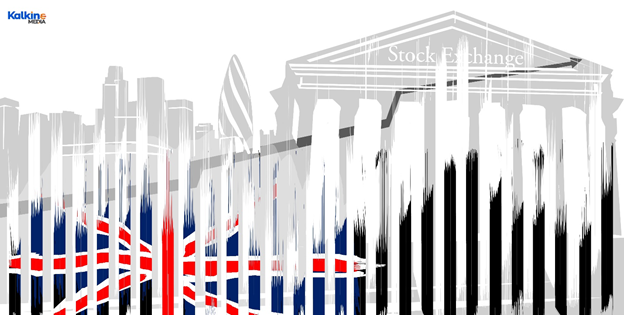What is an Immediate or Cancel Order (IOC)?
The term IOC stands for immediate or cancel order, which refers to a type of time-bound orders accessible to traders that must be executed immediately. An immediate or cancel order can be defined as an order of buying or selling security that executed fully or partially immediately and get cancelled any unfilled portion as soon as an order fails in the execution. An immediate or cancel order is a type of duration in force order used by investors to specify the duration of an order that remains active in the market and the condition in which an order get cancelled.

Copyright © 2021 Kalkine Media
Understanding Immediate or Cancel Order
Traders and investors choose and submit an immediate or cancel order (IOC) according to their specific execution conditions either a limit IOC or market IOC. A limit immediate or cancel order (IOC) is proposed at a certain price, on the other side a market immediate or cancel order (IOC) has no specific price and transacts with the finest offer price for purchase and finest bid price for selling. There are other various duration orders including Fill Or Kill (FOK), Good Till Canceled (GTC) and Al l-Or-None (AON). An immediate or cancel order (IOC) is different from duration orders as they only need a partial fill, contrary Fill Or Kill (FOK) and All-Or-None (AON) must be filled fully, or they get canceled. The Good Till Canceled (GTC) orders stay active till the execution in market or canceled by the client, hence mostly brokers choose to cancel them in the range of 30 and 90 days. The immediate or cancel order (IOC) is beneficial for investors to restrict the risk and offers price improvement through providing more flexibility and speed execution. Usually, investors choose immediate or cancel order for a large order just to avoid the filling of order at array of prices.
The immediate or cancel order (IOC) cancels the unfilled part of an order automatically as soon as it placed and doesn’t fill immediately. In order to understand immediate or cancel order (IOC), an individual has to know the basics of the stock market. To start the investment in this industry, an individual should open a free trading account. Trading account is very simple and easy to open, and with a trading account the entry barrier has been reduced for a beginner. When an individual put a buying or selling order after opening a trading account, there is no surety that an order will be filled. There are chances of unsuited match between sell of stock and demand of the stock. If an individual put a buy order, but enough sellers are not available, an individual have to wait for the completion of an order.
Frequently Asked Questions (FAQs)
What are the types of Immediate or Cancel Order?
There are two types of Immediate or Cancel Order (IOC), include:

Copyright © 2021 Kalkine Media
- Limit IOC orders: A limit Immediate or Cancel Order (IOC) refers to an order that executed to the specific price or may cancel after reaching to retain limit.
- Market IOC orders: A Market Immediate or Cancel Order (IOC) refers to an order that executed depending on the current market price.
What is the difference between IOC from a Day Order?
A day order refers to an order that will expire if it is not executed by the end of the trading day. It is a limit day order that will be expired by the end of the trading day. One of the major differences between an Immediate or Cancel Order (IOC) and day order is their execution.
In a day order, when an order is put, it remains active as pending orders for the whole trading day and gets cancelled at the end of trading day. Whereas in an Immediate or Cancel Order, when an order is put and not executed immediately, it will be cancelled automatically as soon as it placed.
What is the role of Immediate or Cancel Order in the Share Market?
An Immediate or Cancel Order is one of the types of orders that are used by traders and investors to place an order. The order must be executed as it placed in the market. The order ensures the buying and selling of a security immediately, or it gets cancelled the unfilled part of an order automatically.

Copyright © 2021 Kalkine Media
An Immediate or Cancel Order can be defined as a period order, and an investor can choose how long the order will be active in the market. In share market, an IOC is a zero-duration order as the time gap between the placing and execution of an order is just a few seconds. In stock market, an Immediate or Cancel Order (IOC) can be set market order. For instance, an investor places an Immediate or Cancel Order to buy 150 shares of ABC business, the order placed in the market directly, and it gets cancelled in the case of unfilled order. If in case only 100 shares are purchased, remaining order of 100 shares gets cancelled automatically.
 Please wait processing your request...
Please wait processing your request...